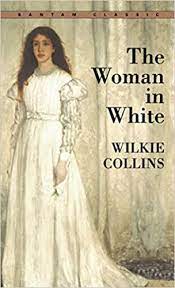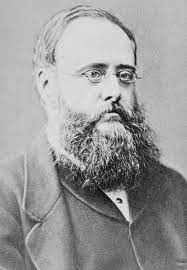The Woman in White Page #7
The Woman in White is Wilkie Collins's fifth published novel, written in 1859. It is a mystery novel and falls under the genre of "sensation novels". The story is an early example of detective fiction with protagonist Walter Hartright employing many of the sleuthing techniques of later private detectives
"Don't ask me: don't make me talk of it," she answered. "I'm not fit now. I have been cruelly used and cruelly wronged. You will be kinder than ever, if you will walk on fast, and not speak to me. I sadly want to quiet myself, if I can." We moved forward again at a quick pace; and for half an hour, at least, not a word passed on either side. From time to time, being forbidden to make any more inquiries, I stole a look at her face. It was always the same; the lips close shut, the brow frowning, the eyes looking straight forward, eagerly and yet absently. We had reached the first houses, and were close on the new Wesleyan college, before her set features relaxed and she spoke once more. "Do you live in London?" she said. "Yes." As I answered, it struck me that she might have formed some intention of appealing to me for assistance or advice, and that I ought to spare her a possible disappointment by warning her of my approaching absence from home. So I added, "But to-morrow I shall be away from London for some time. I am going into the country." "Where?" she asked. "North or south?" "North--to Cumberland." "Cumberland!" she repeated the word tenderly. "Ah! wish I was going there too. I was once happy in Cumberland." I tried again to lift the veil that hung between this woman and me. "Perhaps you were born," I said, "in the beautiful Lake country." "No," she answered. "I was born in Hampshire; but I once went to school for a little while in Cumberland. Lakes? I don't remember any lakes. It's Limmeridge village, and Limmeridge House, I should like to see again." It was my turn now to stop suddenly. In the excited state of my curiosity, at that moment, the chance reference to Mr. Fairlie's place of residence, on the lips of my strange companion, staggered me with astonishment. "Did you hear anybody calling after us?" she asked, looking up and down the road affrightedly, the instant I stopped. "No, no. I was only struck by the name of Limmeridge House. I heard it mentioned by some Cumberland people a few days since." "Ah! not my people. Mrs. Fairlie is dead; and her husband is dead; and their little girl may be married and gone away by this time. I can't say who lives at Limmeridge now. If any more are left there of that name, I only know I love them for Mrs. Fairlie's sake." She seemed about to say more; but while she was speaking, we came within view of the turnpike, at the top of the Avenue Road. Her hand tightened round my arm, and she looked anxiously at the gate before us. "Is the turnpike man looking out?" she asked. He was not looking out; no one else was near the place when we passed through the gate. The sight of the gas-lamps and houses seemed to agitate her, and to make her impatient. "This is London," she said. "Do you see any carriage I can get? I am tired and frightened. I want to shut myself in and be driven away." I explained to her that we must walk a little further to get to a cab-stand, unless we were fortunate enough to meet with an empty vehicle; and then tried to resume the subject of Cumberland. It was useless. That idea of shutting herself in, and being driven away, had now got full possession of her mind. She could think and talk of nothing else. We had hardly proceeded a third of the way down the Avenue Road when I saw a cab draw up at a house a few doors below us, on the opposite side of the way. A gentleman got out and let himself in at the garden door. I hailed the cab, as the driver mounted the box again. When we crossed the road, my companion's impatience increased to such an extent that she almost forced me to run. "It's so late," she said. "I am only in a hurry because it's so late." "I can't take you, sir, if you're not going towards Tottenham Court Road," said the driver civilly, when I opened the cab door. "My horse is dead beat, and I can't get him no further than the stable." "Yes, yes. That will do for me. I'm going that way--I'm going that way." She spoke with breathless eagerness, and pressed by me into the cab. I had assured myself that the man was sober as well as civil before I let her enter the vehicle. And now, when she was seated inside, I entreated her to let me see her set down safely at her destination. "No, no, no," she said vehemently. "I'm quite safe, and quite happy now. If you are a gentleman, remember your promise. Let him drive on till I stop him. Thank you--oh! thank you, thank you!" My hand was on the cab door. She caught it in hers, kissed it, and pushed it away. The cab drove off at the same moment--I started into the road, with some vague idea of stopping it again, I hardly knew why--hesitated from dread of frightening and distressing her--called, at last, but not loudly enough to attract the driver's attention. The sound of the wheels grew fainter in the distance--the cab melted into the black shadows on the road--the woman in white was gone. Ten minutes or more had passed. I was still on the same side of the way; now mechanically walking forward a few paces; now stopping again absently. At one moment I found myself doubting the reality of my own adventure; at another I was perplexed and distressed by an uneasy sense of having done wrong, which yet left me confusedly ignorant of how I could have done right. I hardly knew where I was going, or what I meant to do next; I was conscious of nothing but the confusion of my own thoughts, when I was abruptly recalled to myself--awakened, I might almost say--by the sound of rapidly approaching wheels close behind me. I was on the dark side of the road, in the thick shadow of some garden trees, when I stopped to look round. On the opposite and lighter side of the way, a short distance below me, a policeman was strolling along in the direction of the Regent's Park. The carriage passed me--an open chaise driven by two men. "Stop!" cried one. "There's a policeman. Let's ask him." The horse was instantly pulled up, a few yards beyond the dark place where I stood. "Policeman!" cried the first speaker. "Have you seen a woman pass this way?" "What sort of woman, sir?" "A woman in a lavender-coloured gown----" "No, no," interposed the second man. "The clothes we gave her were found on her bed. She must have gone away in the clothes she wore when she came to us. In white, policeman. A woman in white." "I haven't seen her, sir." "If you or any of your men meet with the woman, stop her, and send her in careful keeping to that address. I'll pay all expenses, and a fair reward into the bargain." The policeman looked at the card that was handed down to him. "Why are we to stop her, sir? What has she done?" "Done! She has escaped from my Asylum. Don't forget; a woman in white. Drive on." V "She has escaped from my Asylum!" I cannot say with truth that the terrible inference which those words suggested flashed upon me like a new revelation. Some of the strange
Translation
Translate and read this book in other languages:
Select another language:
- - Select -
- 简体中文 (Chinese - Simplified)
- 繁體中文 (Chinese - Traditional)
- Español (Spanish)
- Esperanto (Esperanto)
- 日本語 (Japanese)
- Português (Portuguese)
- Deutsch (German)
- العربية (Arabic)
- Français (French)
- Русский (Russian)
- ಕನ್ನಡ (Kannada)
- 한국어 (Korean)
- עברית (Hebrew)
- Gaeilge (Irish)
- Українська (Ukrainian)
- اردو (Urdu)
- Magyar (Hungarian)
- मानक हिन्दी (Hindi)
- Indonesia (Indonesian)
- Italiano (Italian)
- தமிழ் (Tamil)
- Türkçe (Turkish)
- తెలుగు (Telugu)
- ภาษาไทย (Thai)
- Tiếng Việt (Vietnamese)
- Čeština (Czech)
- Polski (Polish)
- Bahasa Indonesia (Indonesian)
- Românește (Romanian)
- Nederlands (Dutch)
- Ελληνικά (Greek)
- Latinum (Latin)
- Svenska (Swedish)
- Dansk (Danish)
- Suomi (Finnish)
- فارسی (Persian)
- ייִדיש (Yiddish)
- հայերեն (Armenian)
- Norsk (Norwegian)
- English (English)
Citation
Use the citation below to add this book to your bibliography:
Style:MLAChicagoAPA
"The Woman in White Books." Literature.com. STANDS4 LLC, 2025. Web. 22 Jan. 2025. <https://www.literature.com/book/the_woman_in_white_1567>.




Discuss this The Woman in White book with the community:
Report Comment
We're doing our best to make sure our content is useful, accurate and safe.
If by any chance you spot an inappropriate comment while navigating through our website please use this form to let us know, and we'll take care of it shortly.
Attachment
You need to be logged in to favorite.
Log In